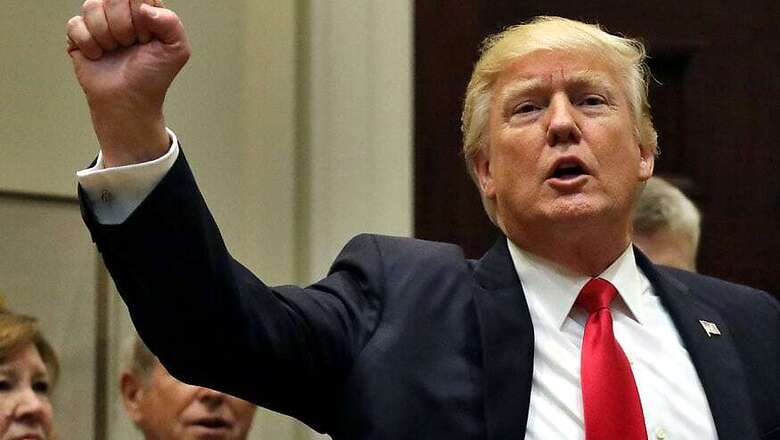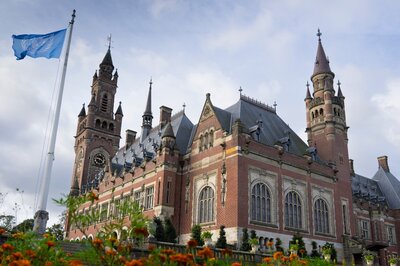
views
Washington: Having so far failed to persuade judges to allow its travel ban to take effect, the Trump administration is turning to the nation's highest court with its slim conservative majority.
The Justice Department on Thursday formally asked the Supreme Court to let a ban on visitors from six mostly Muslim countries and refugees from around the world to be put in place. The high court also is being asked to uphold the constitutionality of the Trump travel policy, which lower courts have blocked because it shows anti-Muslim prejudice.
The administration is banking on being able to persuade at least five justices, a majority of the nine-member court, that they should defer to the president's considerable authority over immigration and his responsibility for keeping the nation safe.
Trump determined that a 90-day pause on visitors from Iran, Libya, Somalia, Sudan, Syria and Yemen is needed to "safeguard national security," acting Solicitor General Jeffrey Wall wrote in the Justice Department's filings.
"The courts below openly second-guessed the president's finding that those conditions and risks provided the basis for ... (the) temporary pause," Wall wrote. The administration also wants to halt the U.S. refugee program for 120 days.
Omar Jadwat, director of the ACLU's Immigrants' Rights Project, said the justices shouldn't disturb court rulings that are keeping the travel ban on hold. "The government has not set forth any justification for a stay," Jadwat said, using the legal term by which the Supreme Court would block lower court rulings.
The administration's Supreme Court filings reflect many of the same arguments that its lawyers have made in the lower courts, including their view that statements President Donald Trump made as a candidate — before he took the presidential oath — should not be considered.
Both the 4th U.S. Circuit Court of Appeals and a federal judge in Hawaii cited Trump's campaign comments as evidence that religious prejudice undergirds the travel ban. Those court orders blocking the ban are the subject of the administration's plea to the Supreme Court.
"Without campaign materials, the court of appeals' analysis collapses," Wall wrote in his high court request for an order to allow the policy to be enforced.
Trump's recent speech to Middle East leaders in Saudi Arabia provides more evidence that Trump's policy was not motivated by anti-Muslim prejudice because the president explicitly said the fight against terrorism "'is not a battle between different faiths,'" Wall wrote.
But Jadwat said Trump passed up a clear opportunity in front of many leaders of the Arab world "to explain or retract any of his earlier statements."
The justices will weigh those arguments in the coming weeks.
Justice Neil Gorsuch joined the court in April, giving it a full complement of nine justices for the first time since conservative icon Antonin Scalia died in February 2016. A full bench not only eliminated the prospect of a tie when all the justices are participating, but also restored the court's conservative tilt.
Even with Gorsuch aboard, though, Justice Anthony Kennedy probably will be in the majority whatever the outcome. Kennedy is the conservative justice who is closer to the ideological center of the court than any of his colleagues, and he often casts the decisive vote when the court is otherwise split between conservatives and liberals.
A Kennedy opinion from 2015 also has emerged as a key element in the legal fight. The 2015 case, Kerry v. Din, involved an American citizen's challenge to the denial of a visa for her Afghan husband.
Kennedy sided with the other conservative justices in favor of the Obama administration and against U.S. citizen Fauzia Din. But 4th Circuit Chief Judge Roger Gregory used Kennedy's opinion to buttress his majority opinion against the Trump travel ban.
Judges must "step away from our deferential posture and look behind the stated reason for the challenged action" when a lawsuit makes a strong argument about bad faith motivating the policy, Gregory wrote, citing Kennedy's opinion.
The dissenting judges said Gregory misread Kennedy's opinion. "Nowhere did the Din Court authorize going behind the government's notice for the purpose of showing bad faith," the dissenters said.
Kennedy also has been the focus of speculation that he may soon retire, yet another wild card that could unsettle the court's consideration of the Trump policy.
The administration is asking for quick action from the high court that would freeze the lower court rulings and allow the policy to be put in place. Both sides would file their legal arguments about whether the policy violates the Constitution or federal law over the summer and the justices could hear argument as early as the fall, under the schedule proposed by the administration Thursday.
The Supreme Court is almost certain to step into the case because it almost always has the final say when a lower court strikes down a federal law or presidential action.
But the initial vote on whether to let the travel ban take effect, even as the court weighs the case, would signal whether the government is likely to win in the end. If at least five justices vote to let the travel ban take effect, there's a good chance they also would uphold the policy later on.
The temporary nature of the bans means they could well have run their course by the time the case is ready to be argued, unless the court were to schedule an unusual special argument session.
There is one other potential wrinkle involving timing. Some critics of the travel policy have said that the policy's 90-day halt to visitors from the six countries is about to expire in mid-June, even though the ban itself has never taken effect.
That's because the executive order Trump signed in March said the ban would expire 90 days after the order's effective date, March 16.
But the administration's argument appears to be that the clock wouldn't start until the policy can take effect.




















Comments
0 comment